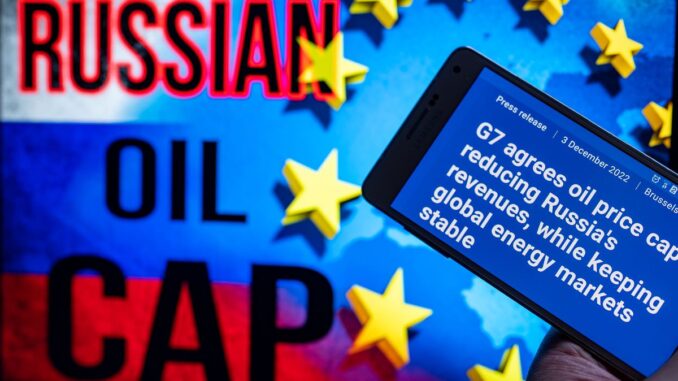
This past week was wild for the global energy markets. It has been a whirlwind of geopolitical jockeying for energy security. The key issues, as I see them, are the ability of global countries to secure long-term energy supplies and getting the right mix of renewable and fossil fuels that their voting blocs will put up with.
This weekend was truly a target-rich environment for oil and gas news. Let’s break down the three key points and players.
OPEC
Did not waiver from October’s 2 mbpd production cut as they did not feel like the market price was going to go down even after the Russian oil price cap went into effect. They really felt like the move by the EU to enforce the sanctions and price cap would keep global oil prices high.
EU Russian Price Cap
There are several key issues surrounding the Russian price cap. First and foremost, Putin feels that the price cap is purely “Mind over Matter” as “He does Mind because the price cap does not Matter.” – Jay R. Young.
Price cap enforced by sanctions on the insurance companies in the UK. Those companies control 95% of the tanker insurance for global oil shipments.
Putin’s response to the price cap was short and abrupt. Any country that enforces the price cap will not receive any Russian oil. This has the potential to pull from 1.4 mbpd to 2 mbpd and move it to the markets outside of OPEC and OPEC +.
“Russia said publicly it was preparing a response to the new measures, after previously announcing they would not sell oil at any price dictated by third parties. Kremlin spokesman Dmitry Peskov said, “A decision [on retaliatory measures] is being prepared… One thing is clear – we will not recognize any price caps.” Presently the cap is set below the price of the premier grade of Russian crude, Urals, which according to Bloomberg’s oil strategist Julian
Lee, is selling at roughly $50 to China and India, so the cap may be of limited effect.”-The Daily Financial Trends.
India
India has been buying Russian crude at $35 off Brent for a long time. Said they are not going to follow the procedures and keep buying from Russia. The Indian Foreign Prime Minister’s quotes are below.
“Russia has been a steady and time-tested partner. Any objective evaluation of our relationship over many decades would confirm that it has actually served both our countries very, very well,” Jaishankar said in a joint news conference.
“As the world’s third-largest consumer of oil and gas, a consumer where the levels of income are not very high, it is our fundamental obligation to ensure that the Indian consumer has the best possible access on the most advantageous terms to international markets,” he said.

India has emerged as Russia’s largest oil customer after China following a boycott by Western buyers [Maxim Shipenkov/Pool via Reuters]
The Bottom Line
What will be the effect on oil markets? – It has the potential to cause a dramatic short-term spike in oil prices. The longer-term effect of the price cap from the EU will be an additional push for Brazil, Russia, China, and India to move oil from the U.S. dollar. This new structure of world currency and insurance for tankers is through the h the BRICS organization of countries. This would be a devastating long-term structure of the global energy market and negatively impact the United States.
China is meeting with Saudi Arabia this week to organize payment systems outside western sanctions. Who will win, and who will lose?
The winners will be Russia, China, Saudi Arabia, and India.
The losers will be the EU, UK, and the United States. The real losers will be the world consumers as this has the potential of pulling over 2 mbpd off the open market. That could send oil well over $100 again quickly.
How will it affect the U.S. oil Industry? Almost negligible in the short term. The current administration has everything set in motion against the U.S. oil and gas industry, and they really won’t take risks or do anything to help lower the prices. In the long run, it will hurt the United States unless we can get pipelines opened to Canada for the heavy oil that we import from sanctioned countries like Venezuela and Russia. And get pipelines moving to transport more natural gas to market. Yesterday, the United States and Britain launched an energy partnership to boost LNG shipments. It was not widely publicized as this is dire to the current administration’s opposition to the current oil and gas companies. The problem is that the UK is taking the Biden leadership at their word and will allow more natural gas (LNG) to be exported by the U.S. oil and gas companies.
The UK is using an estimated 65% fossil and nuclear for their energy needs this week. Their energy mix reports show that offshore wind and solar are very unsteady.
As I pointed out at the beginning of the article, there is global jockeying for energy security and fossil fuels are back into the front of political leadership. Although they are trying to keep it under wraps. The balance between fossil fuels and renewable energy is counterbalanced by what the voting blocks of their perspective countries will stand for.
In my opinion, the United States is set for an energy resurgence in the oil and gas markets. The only thing holding back the resurgence is being crippled by the Biden administration. They will commit to the U.K. more volume of LNG but will not allow the regulatory processes to produce the oil and gas.
As always, check with your CPA if alternative investments are good for your portfolio Take the assessment and see if it is right for you HERE. Please reach out to our team at any time for answers to your questions. Jay R. Young, CEO, King Operating Forbes Books Author of “The Upside of Investing in Oil and Gas



